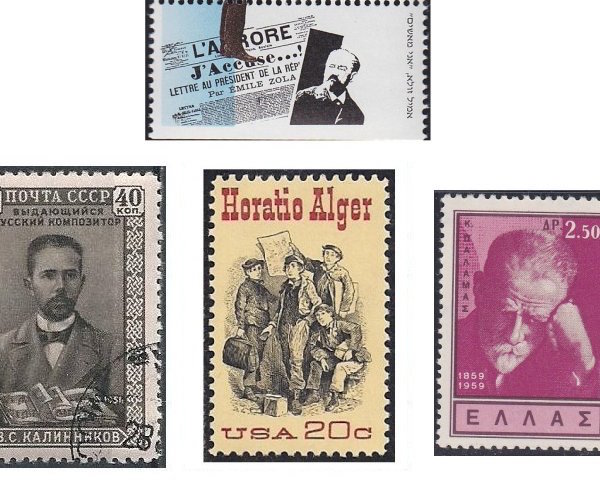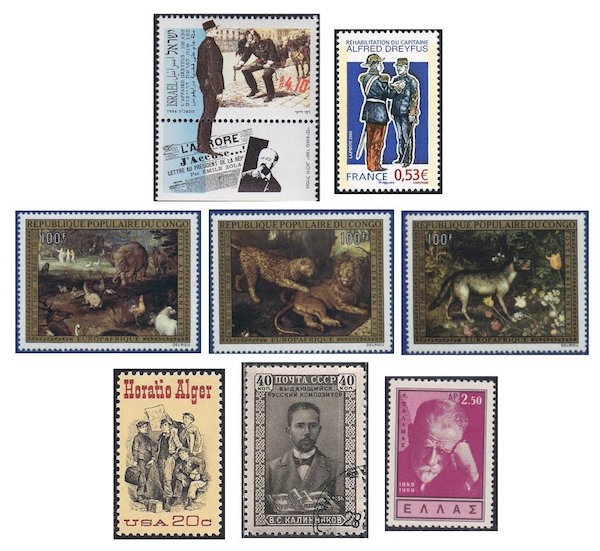The Arts on the Stamps of the World — January 13
An Arts Fuse regular feature: the arts on stamps of the world.

By Doug Briscoe
On this date in 1898 Émile Zola’s famous open letter “J’accuse…!” appeared in print in the periodical L’Aurore, decrying the unjust conviction and imprisonment of the Jewish army officer Alfred Dreyfus on charges of treason. Although not the only public protest made at the time, “J’accuse…!” has resonated strongly as one of the great examples of speaking truth to power. As early as 1915, the quotation was taken up by the German pacifist Richard Grelling as the title of his book condemning the actions of the Kaiser’s Empire; Abel Gance’s eponymous film of 1919 was a general indictment of World War I, and so on. The 1994 stamp issued by Israel remembering the Dreyfus affair came with a label (below the stamp) reproducing the newspaper’s headline and a portrait of Zola. The French centenary stamp of 2006 addresses Dreyfus’s reinstatement after his five-year incarceration.
Flemish painter Jan Brueghel the Elder, born in 1568, died on this date in 1625. He was the son of Pieter Brueghel the Elder, brother of Pieter Brueghel the Younger, father of Jan Brueghel the Younger, and friend and collaborator of the one and only Rubens. Though he painted many different subjects, JBtE is particularly well known for his flower still lifes and for the invention of the “paradise landscape,” in which teeming animal figures commune peacefully against a nature backdrop. These stamps from the Congo (PR) show three details from the same painting, Earth: The Earthly Paradise, sometimes called The Allegory of Earth (1618). In the first image, in the distance, besides the fauna and flora, we see the figures of God, Adam, and Eve.
American writer Horatio Alger Jr. (January 13, 1832 – July 18, 1899) produced about a hundred novels, the majority of them dealing, rather single-mindedly, it must be admitted, with poor boys with holes in their clothes who, through perseverance, hard work, and clean living (and the occasional affluent benefactor) achieve a condition of health, wealth, and wisdom (emphasize wealth). Alger is, in short, Mr. Rags-to-Riches. Born here in Massachusetts, in Chelsea, he was a Harvard alum who found his metier with Ragged Dick, the fourth of his books, in 1867. This was after he had left the ministry in Brewster, Massachusetts, following accusations, which he did not deny, of improprieties with boys and relocated to New York City. His subsequent writings and humanitarian efforts have been seen as a cathartic form of atonement, and the rest of his life was free of any breath of scandal despite his adoption of two street boys in the early 1880s. An asthma sufferer from childhood, Alger died at the home of his sister in South Natick.

Speaking of boys, Vasily Sergeyevich Kalinnikov (13 January [O.S. 1 January] 1866 – 11 January 1901 [O.S. 29 December 29 1900]) became choir director at the Oryol Seminary when he was just fourteen. He attended the Moscow Conservatory but couldn’t afford the tuition and went instead on a scholarship to the Moscow Philharmonic Society School. He played bassoon, timpani, and violin and was briefly director, at Tchaikovsky’s recommendation, of two theaters in Moscow. His worsening health—he died of tuberculosis just two days before his 35th birthday—forced him to relocate to Yalta, where he wrote his two symphonies. The First, which remains Kalinnikov’s best known work today (good stuff), was played in several European cities during his lifetime. Rachmaninov helped get some of Kalinnikov’s music published, and after the composer’s death, the publisher Jurgenson increased the fees for his works and paid them to Kalinnikov’s widow. The old stamp was issued by the Soviet Union in 1951, and it’s a pricey one—an unused copy has an asking price of US$20—but recently I found a used copy at bargain price and snapped it up.
Born 13 January (O.S. 8 January) 1859, the important Greek poet Kostis Palamas (accent both names on the ultima), twice nominated for the Nobel Prize, was regarded by Romain Rolland as the greatest European poet of his day. A dominant figure in Greek literature, he was a co-founder of the New Athenian School and wrote the words to the Olympic Hymn (music by Spyridon Samaras) for the first modern Olympics in 1896; this hymn has been performed at every Olympic Games since 1960. (It is not to be confused with John Williams’ Olympic Fanfare and Theme of 1984.) Kostis Palamas died on 27 February 1943. His most important poem is held to be “The Twelve Lays of the Gypsy” of 1907.
A graduate of the University of Massachusetts with a B.A. in English, Doug Briscoe worked in Boston classical music radio, at WCRB, WGBH, and WBUR, for about 25 years, beginning in 1977. He has the curious distinction of having succeeded Robert J. Lurtsema twice, first as host of WGBH’s weekday morning classical music program in 1993, then as host of the weekend program when Robert J.’s health failed in 2000. Doug also wrote liner notes for several of the late Gunther Schuller’s GM Recordings releases as well as program notes for the Boston Classical Orchestra. For the past few years he’s been posting a Facebook “blog” of classical music on stamps of the world, which has now been expanded to encompass all the arts for The Arts Fuse.
